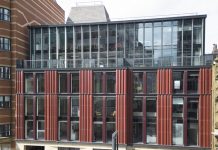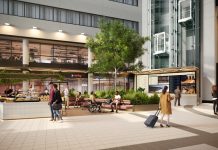Manchester’s commercial real estate market is set to be increasingly underpinned by agile working, as new data shows that workstation ratios at local offices are up to 1.6 persons per desk – up from 1-1.2 persons per workstation pre-COVID.
OBI’s Q3 Manchester Workspace Market Update, published by the consultancy this week, predicts that this trend will accelerate, as SMEs continue to take strides towards returning to the office and larger corporations remain cautious.
Andrew Crabtree in OBI’s transactions and asset management team explained how the firm – which is responsible for more than 40% of all space transacted in Manchester – foresees the coming months for the sector.
“Following the lockdown in March, the market was effectively placed on pause. However, with the relaxation of COVID-19 restrictions towards the end of Q2 2020, a number of businesses – primarily SME’s who had initially placed their requirements on hold – started to progress their office acquisitions, as they recognised the importance and value of reuniting their workforce,” said Andrew.
“It was previously anticipated that September would be a turning point for businesses returning to the office, but increased restrictions due to COVID-19 pressed pause again for many occupiers undertaking their planned return to the workplace.
“The constantly shifting nature of the pandemic and its associated restrictions have meant that an even sharper focus has been placed on spaces and leases which can accommodate flexibility in the short term. Landlords need to be flexible in providing shorter term agreements to retain and establish longer term relationships while businesses are still trying to identify their longer-term workspace requirements.”
Relocations have also provided an opportunity to refresh the way businesses utilise their workspace in a post-COVID-19 world, with a move to more flexible and agile work concepts. OBI’s research team outlines in the report that pre-COVID, most businesses operated on a simple one-person-per-workstation basis, with a small percentage of more forward-thinking agile occupiers adopting slightly more flexible ratios of up to 1.2 persons per workstation.
Post-COVID, however, OBI have found that businesses, including those from the more traditional sectors, are rethinking the way in which they utilise their offices, with a move towards desk ratios of up to and in excess of 1.6 persons per workstation.
Based on Q3’s take-up, OBI also understands that occupiers who are relocating are focusing even further on quality, with employee wellbeing being placed increasingly high on the agenda.
“We foresee these trends continuing to accelerate as larger corporate requirements are reinvigorated, and we expect that many will reduce the size of their offices due to the agile way of working.
“Whilst this may see an overall reduction in the amount of workspace occupiers may require, it is likely to result in a flight to quality.
“The market pause from larger businesses is evident with only two transactions above 10,000 sq ft completing in Q3 2020. However, there is continued resilience from SMEs, which is evidenced by transactions of sub-5,000 sq ft representing 86% of deals completed in Q3 2020.”
Despite a rockier Q3 than anticipated during H1 2020, OBI remain optimistic about what is to come for the city.
“The recent lockdown measures announced by the government may create a short-term pause in the market.
“However, we expect that occupiers who are under offer or actively negotiating on new workspace will press on with their acquisitions, with a view to delaying their lease commencement until early in the new year. As soon as restrictions begin to ease, we expect SMEs to be proactive on returning to the office and continue to be the driving force behind office demand.
“Due to the number of larger businesses who have paused relocation plans in Manchester, it could lead to pent up demand once the current restrictions are relaxed, with occupiers continuing to review their occupational requirements against the backdrop of more agile working practices.
“We expect to see a recovery at the start of 2021. This is already evident with BT committing to a 175,000 sq ft pre-let at New Bailey. With completion of the building approximately two years away, it’s a clear indication of occupiers’ confidence in the market and the long-term requirement for city centre offices in a post-COVID world.
“There remains a healthy pipeline of live requirements with demand coming from a deep pool of indigenous local businesses, supported by potential inward investment to the city on a regional, national and international level. We have already started to see further signs of businesses ‘north shoring’ and expect this to continue in 2021, with occupiers in the e-commerce, fintech and cyber sectors being attracted by Manchester’s digital and tech talent.”
Founded in 2010 by Will Lewis and Dominic Horridge, OBI is headquartered in Manchester with an additional office in Leeds.






















